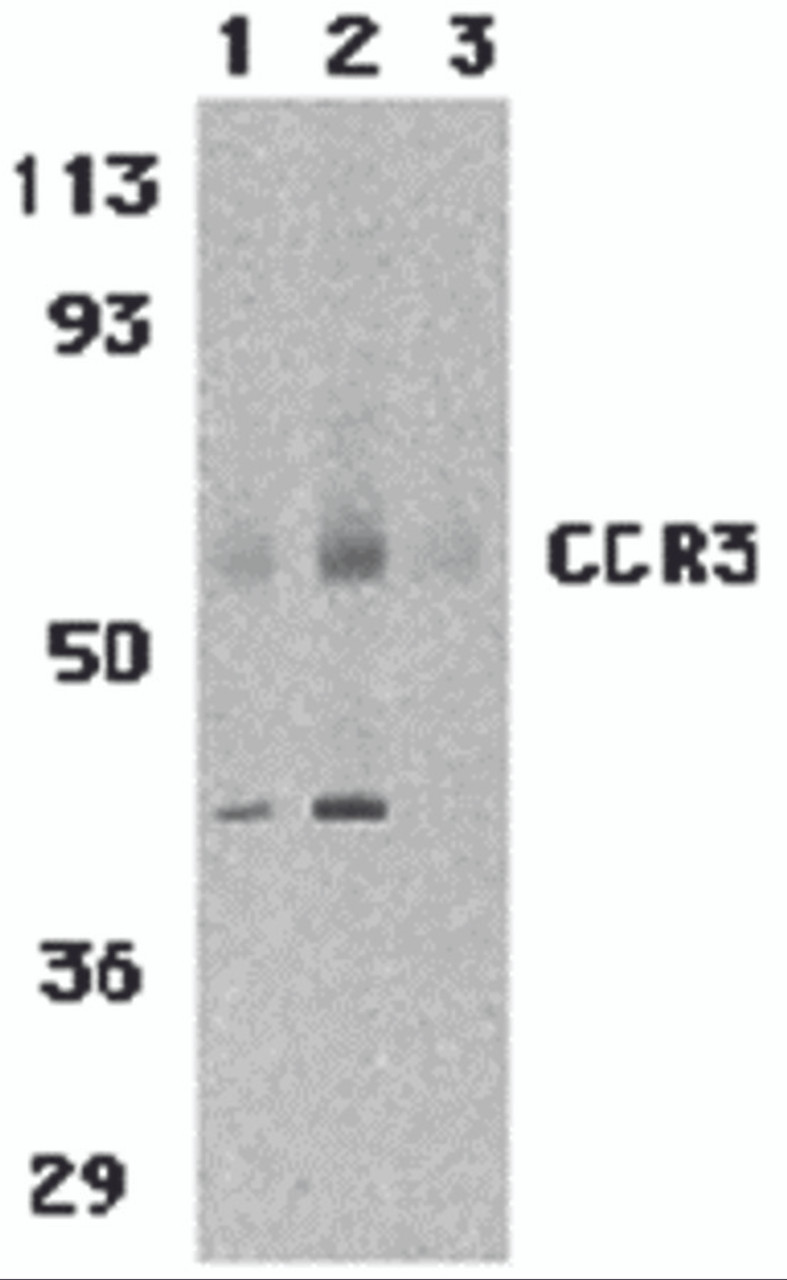Product Description
CCR3 Antibody | 1109 | ProSci
Host: Rabbit
Reactivity: Human, Mouse, Rat
Homology: N/A
Immunogen: CCR3 antibody was raised against a 14 amino acid synthetic peptide from near the amino terminus of human CCR3.
The immunogen is located within the first 50 amino acids of CCR3.
Research Area: Chemokines & Cytokines, Neuroscience, Cancer, Infectious Disease
Tested Application: E, WB
Application: CCR3 antibody can be used for the detection of CCR3 by Western blot at 1 - 2 μg/mL.
Antibody validated: Western Blot in human samples. All other applications and species not yet tested.
Specificiy: N/A
Positive Control 1: Cat. No. 1306 - Human Spleen Tissue Lysate
Positive Control 2: N/A
Positive Control 3: N/A
Positive Control 4: N/A
Positive Control 5: N/A
Positive Control 6: N/A
Molecular Weight: N/A
Validation: N/A
Isoform: N/A
Purification: CCR3 Antibody is immunoaffinity purified IgG.
Clonality: Polyclonal
Clone: N/A
Isotype: IgG
Conjugate: Unconjugated
Physical State: Liquid
Buffer: CCR3 Antibody is supplied in PBS containing 0.02% sodium azide.
Concentration: 1 mg/ml
Storage Condition: CCR3 antibody can be stored at 4˚C for three months and -20˚C, stable for up to one year. As with all antibodies care should be taken to avoid repeated freeze thaw cycles. Antibodies should not be exposed to prolonged high temperatures.
Alternate Name: CCR3 Antibody: CKR3, CD193, CMKBR3, CC-CKR-3, C-C chemokine receptor type 3, Eosinophil eotaxin receptor, C-C CKR-3
User Note: Optimal dilutions for each application to be determined by the researcher.
BACKGROUND: CCR3 Antibody: Human immunodeficiency virus (HIV) and related virus require coreceptors to infect target cells. Some G protein-coupled receptors including CCR5, CXCR4, CCR3, CCR2b, CCR8, GPR15, STRL33, and CX3CR1 in the chemokine receptor family were recently identified as HIV coreceptors. CCR5, CXCR4 and CCR3 are the principal receptors for HIV fusion and entry of target cells. CCR3 facilitates infection by a subset of virus. CCR3 and CCR5 promote efficient infection of microglia, the major target cells in the CNS. High levels of CCR3 and CXCR4 expression were found on the neurons from both the central and peripheral nervous systems. The CCR3 ligand, eotaxin, and an anti-CCR3 antibody inhibited HIV infection of microglia. These results indicate CCR3 plays an important role in HIV infection of CNS.
 Euro
Euro
 USD
USD
 British Pound
British Pound
 NULL
NULL














